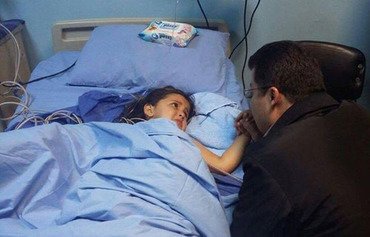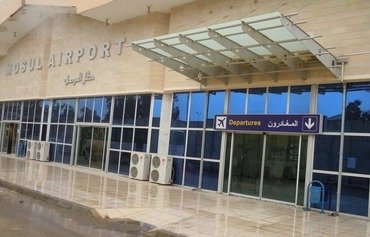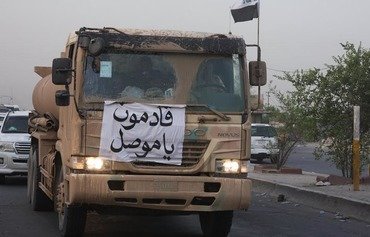In stark contrast with the propaganda spread by the "Islamic State of Iraq and the Levant" (ISIL), life under the group's rule was harsh, residents who escaped Mosul told Diyaruna.
The group's fighters were "merciless", according to Khalil Ibrahim, who fled his home in eastern Mosul's al-Samah 2 neighbourhood for al-Khazir camp.
"We were subjected to indescribable humiliation," he said. "Food was scarce and expensive to buy. We had days where we could not find anything to eat, and there were people who died of hunger ."
"Most of us were jobless, and we had to sell everything we owned to buy food for our children," Ibrahim said.

Screenshot of an ISIL video attempting to portray a sense of normality inside Mosul.
![Mosul residents who fled the fighting receive aid at a shelter for displaced families in early November. [Photo courtesy of the Iraqi Ministry of Migration and Displacement]](/cnmi_di/images/2016/11/18/6606-isil-mosul-utopis-600_384.jpg)
Mosul residents who fled the fighting receive aid at a shelter for displaced families in early November. [Photo courtesy of the Iraqi Ministry of Migration and Displacement]
"ISIL elements claimed they were providing all the services we needed, and in fact, they were liars and swindlers," said a fellow camp resident, who gave his name only as "Abu Anwar" out of lingering fear for his safety.
"What services did they provide? There was no electricity or drinking water," he told Diyaruna. "We were melting in the heat, and in the cold, we would wrap ourselves in blankets as we did not even have fuel for heating."
"Hospitals are reserved for ISIL elements and their families, and if we fall ill, then we are in God’s hands," he said. "Either we recover or die."
"Misery and fear were our companions," he added.
Deception vs Reality
After it overran Mosul, ISIL released several videos on affiliated websites in which it boasted about the "prosperity" of Mosul residents and how happy they were with the services it provided.
As part of the group’s propaganda efforts, it would invite its followers to visit Mosul "as tourists to enjoy the city".
"They were simply fooling themselves and the world," said Ninawa provincial council security committee chairman Hashim Barifkani.
ISIL elements are "quite skilled at trickery and deception", he told Diyaruna. " Their films and images show their alleged caliphate as heaven, but in reality it was hell. "
The group imposed a media blackout on the cities it occupied, and this helped promote its lies, Barifkani said.
"But news of the suffering of our people and their dire living conditions at the hands of these criminals reached us promptly, and now it is clear for the world to see with the start of the liberation of the city," he added.
However, he cautioned, ISIL elements continue to spread misinformation, most recently by claiming the people of Mosul were fleeing to ISIL-controlled territory out of fear of the army and in search of security.
"This is a categorical lie, because in reality ISIL forces people to go with them when they flee the battlefield to shield them from the Iraqi forces," he said.
Misinformation and lies
"ISIL propaganda has relied on misinformation and spreading lies," Ninawa provincial council head Bashar al-Kiki told Diyaruna.
"The terrorists promoted a life of false prosperity, and the truth of the matter is that the people who were trapped did not have a life and lacked the most basic living standards," he said.
People sold everything they had to provide for themselves after their sources of income vanished and government offices were closed down, he added.
"With the start of the battle to liberate the city, residents became hopeful, and as proof that people wanted desperately to escape this suffering, they supported and significantly co-operated with the liberating forces," al-Kiki said.
Residents who fled Mosul are ecstatic that they are free of ISIL, Kurdistan Democratic Party in Mosul media officer Said Mamuzini told Diyaruna.
"The level of these people’s suffering is unimaginable," he said. "In addition to murders and flagrant human rights violations, they had to live under difficult conditions with no jobs, food or public services."
The operation to liberate the remaining areas of Ninawa from ISIL is on track, he said, adding that "things will soon get back to normal in the city".

![Men wait for their identity to be checked by soldiers from the Iraqi Special Forces' second division in Mosul's eastern district of Karkukli on November 18, 2016. The group of men was taken to a mosque in the newly retaken area for ID checks by the army's intelligence unit and the federal police. [Odd Andersen / AFP]](/cnmi_di/images/2016/11/18/6604-000_i78dh-600_384.jpg)







How did the takfirist "Islamic State of Iraq and the Levant (ISIL)" convince the people of Mosul to allow it to enter the city and destroy it, although there are many army officers who had war and military plans experience? How didn’t they resist against them? How did all just surrender to ISIL, taking into consideration that ISIL has only a few members compared to the size of population in Mosul? Why did tribal chiefs in Mosul swear allegiance to it? It’s a question to be asked to the chiefs of Arab tribes in Mosul. Can I have an answer?
Reply1 Comment(s)